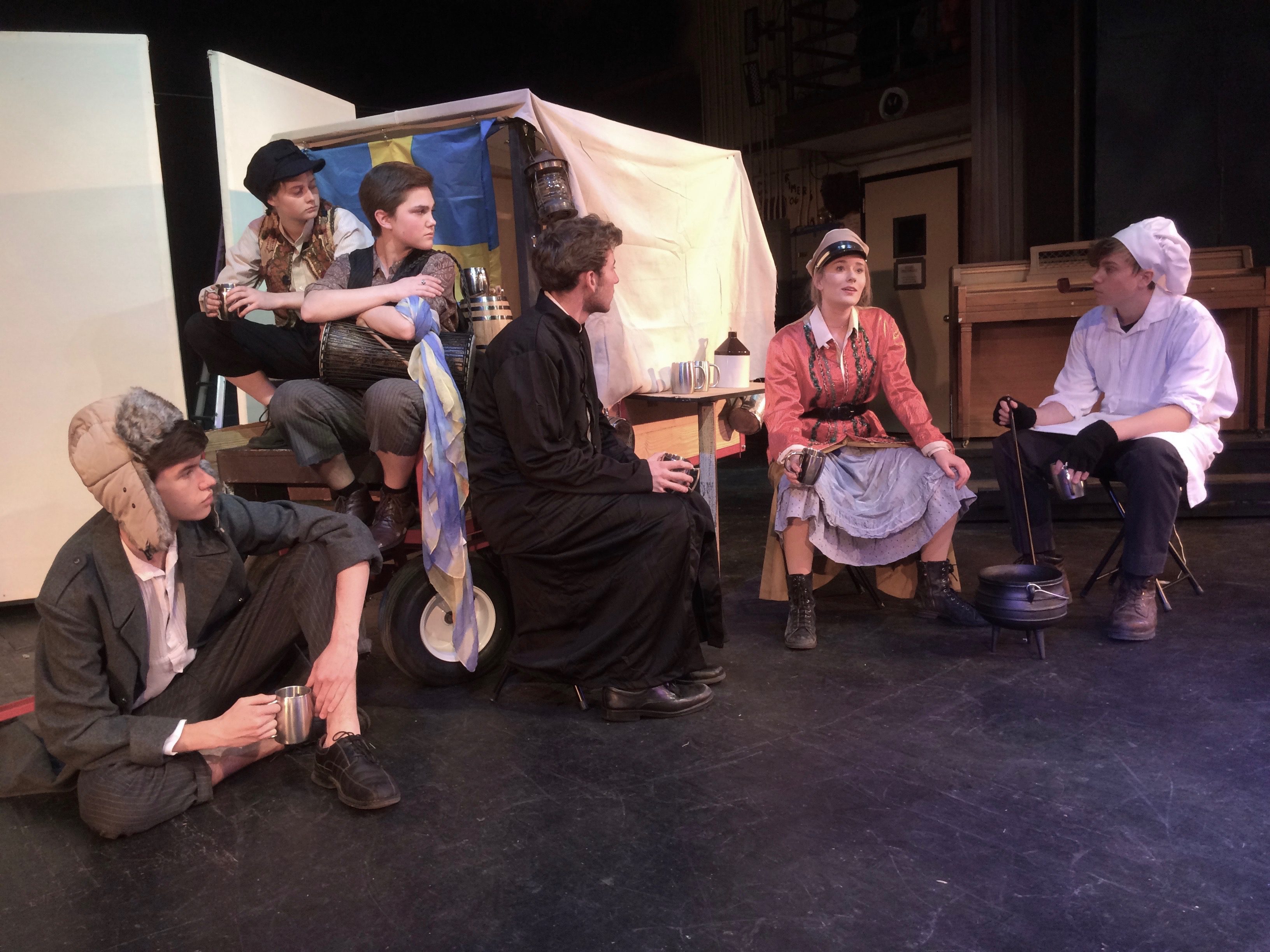Staff Report
In its spring production, the Santa Ynez High School Theatre Group is presenting “Mother Courage and Her Children” by German playwright Bertolt Brecht, perhaps its most ambitious project to date.
With a cast of 32, the production includes 10 songs written by Brecht and several collaborators, notably composer Kurt Weill, performed and sung by members of the cast and ensemble.
In keeping with Brecht’s ideas about “epic theater,” Director Jeff McKinnon has designed a stripped-down stage featuring six constantly shifting components, including a farm wagon and a piano on wheels. Longtime Theatre Group collaborators David Johnson and Tatiana Johnson have designed lights and costumes, respectively.
Perhaps the most influential figure of 20th century theater, Brecht wrote “Mother Courage” in 1939 while in exile in Denmark.
The play was written in reaction to Hitler and Stalin signing a pact against the Allied forces; Brecht called the blossoming conflict “a war between imperialist states.”
Decidedly anti-Hitler and anti-fascist, Brecht was in America in 1948 directing his play “Galileo” when his left-leaning views landed him in front of the House Un-American Activities Committee, where he was interrogated on his supposed Communist beliefs. Though he denied ever being a card-carrying Communist, Brecht soon retreated to East Berlin, where he lived until his death in 1955.
Setting his anti-war allegory in the 17th century’s 30 Years War between Catholic Poland and Protestant Sweden, he provides us with the pragmatic protagonist Ana Fierling, known as Mother Courage, who with her retail wagon follows the war’s destructive path selling her wares to support herself and her three children.
Taking inspiration from American fiction in the Great Depression, most notably from John Steinbeck, Brecht noted that “hunger and love are life’s ruling bustle,” in peacetime but especially in war. Thus we have the driving motivation of Mother Courage and her doomed offspring.
The play debuted in neutral Switzerland in 1941, but not until 1949 did it get its German premiere, directed by Brecht and featuring his wife Helene Weigel as Mother Courage, in what became the founding of the Berliner Ensemble.
Brecht became known as the chief articulator of “Epic Theatre,” a reaction to traditional Western theater, which had been based on the 2,000-year-old Aristotelian “unities” of dramatic theatre.
Brecht believed dramatic theatre created an emotional if not sentimental identification with the audience and the performance, leaving audiences unable to critically analyze any problems represented in the performance. He also believed theatre should use didactic argument to become a political instrument for holding up the issues of his (and our) day as a way to incite dialogue, action and societal change.
He was adamantly opposed to any theater whose primary purpose was to engage an audience’s emotions or sentiments.
Brecht developed techniques that he termed “alienation effects” or “A-Effects,” whose purpose was to disrupt the action or narrative in ways to remind the audience that they were seeing an artificial reproduction of life, a representation of ideas.
A-effects include the very structure of the epic play, departing from the traditional division into acts in favor of a series of a dozen or so independent scenes; breaking of the artificial “fourth wall” or “fourth side” that separates the actor from the audience; intentionally emphasizing the “staginess” of the story through spare or exaggerated sets, costume or makeup; discordant and disturbing music that comments on but does not necessarily fit into the action of the play; and contradictory and ironic arguments presented as logic.
In this way the audience members are turned into analytic observers and become part of an “inquiry” with the cast and playwright.
“Mother Courage and Her Children” plays at 7 p.m. Thursdays through Saturdays, April 19-21 and 26-28, in the Santa Ynez High School Little Theatre.
General admission tickets are $5 for students and $10 for adults. Because of the provocative subject matter, this production may not be suitable for younger children.
For more information, call 688-6487, ext. 2361.







